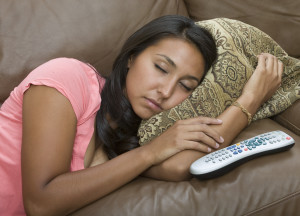 When does a few consecutive sleepy days turn into a more general malaise and fatigue that could be indicative of a larger problem? The average adult needs seven and a half to nine hours of sleep per night. Whether you are meeting your nighttime sleep goals or not, if you are consistently experiencing an overwhelming fatigue that is impacting your lifestyle, talk to your doctor. You may be able to improve your snooze with a few lifestyle changes, or you may need to treat an underlying health condition.
When does a few consecutive sleepy days turn into a more general malaise and fatigue that could be indicative of a larger problem? The average adult needs seven and a half to nine hours of sleep per night. Whether you are meeting your nighttime sleep goals or not, if you are consistently experiencing an overwhelming fatigue that is impacting your lifestyle, talk to your doctor. You may be able to improve your snooze with a few lifestyle changes, or you may need to treat an underlying health condition.
What Does Chronic Fatigue Feel Like?
Everyone has experienced sleepiness at some point, but chronic fatigue is a much more overwhelming and debilitating condition. It is a lingering tiredness that is constant and limiting.
What Causes Feelings of Fatigue?
The following factors could be causing your consistent sleepy sensations:
- Not enough hours of sleep per night
- An unhealthy diet
- Regular use of alcohol
- Regular use of recreational drugs
- A rigorous daily exercise routine or a physically demanding job
- Stress
- Obesity
- Insufficient daily physical activity
- Jet lag
- Medications that cause drowsiness, such as antihistamines
- A recent concussion
- Grief
- Medical treatments such as chemotherapy or radiation therapy
If you are experiencing feelings of unrelenting exhaustion, and if you believe it is not related to any of the factors on the list above, talk to your doctor. He or she may test you for one of the following more complex health conditions that has been known to cause fatigue:
- Cancer
- Major depressive disorder
- Diabetes
- Chronic kidney disease
- Sleep apnea
- Chronic obstructive pulmonary disorder (COPD)
- Acute liver failure
- Anemia
- Anxiety
- Chronic infection or inflammation
- Emphysema
- Heart disease
- Hyperthyroidism (an overactive thyroid)
- Hypothyroidism (an underactive thyroid)
- Inflammatory bowel disease (IBD)
- Multiple sclerosis
Chronic Fatigue Syndrome
An additional potential cause of persistent feelings of fatigue is a condition that, according to the Centers for Disease Control and Prevention (CDC), impacts over one million people in the United States. Chronic fatigue syndrome (CFS) is a physical condition marked by overwhelming fatigue and weakness that makes it difficult to perform daily tasks. Those who suffer from CFS often report difficulty getting out of bed, dressing, and eating. No amount of sleep or rest can eliminate the feelings of exhaustion experienced by CFS sufferers.
While the cause of CFS is not known, it is believed that the condition may be caused by a dysfunction of the immune and central nervous syndrome. If CFS is the cause of your fatigue, your doctor will be able to diagnose the condition and prescribe a treatment plan.
More
 We’ve all been there. It’s Friday night and you decide to stay in with your husband. Half way through the movie, you’ve fallen asleep on the couch, and the next morning, you’re left trying to explain why couldn’t stay awake past 9:30 p.m. If you’re constantly feeling like you require more hours of sleep each night than your husband, know that there is science to help support your sleepiness. Studies show that women’s brains are more complex than those of their male counterparts, resulting in a greater need for more nighttime ZZZ’s.
We’ve all been there. It’s Friday night and you decide to stay in with your husband. Half way through the movie, you’ve fallen asleep on the couch, and the next morning, you’re left trying to explain why couldn’t stay awake past 9:30 p.m. If you’re constantly feeling like you require more hours of sleep each night than your husband, know that there is science to help support your sleepiness. Studies show that women’s brains are more complex than those of their male counterparts, resulting in a greater need for more nighttime ZZZ’s.
According to researchers, women tend to use more of their brains on a daily basis. Women are more likely to spend time multi-tasking, a behavior that maximizes their brains and requires more energy. To help revive them each night, women need about an extra 20 minutes of sleep compared to men.
Despite the fact that women need slightly more sleep than men, they are often pushing their bodies to the limit and are too often running on empty. Just a few of the reasons why women tend to get less overall sleep than men include such factors as being awoken by their male partners or children, pregnancy, and greater levels of stress and worry. The consequences of such exhausting behavior can be severe. Research has found that women who don’t get enough sleep are at risk of suffering from depression and are more likely to experience feelings of anger and hostility.
As if these side effects weren’t enough to make you start turning in early, researchers have also found that women who don’t get enough sleep are at a greater risk of overeating throughout the day. Data supports that women who go to bed earlier eat over 200 calories less than those who stayed up later. In addition, research finds that women who go to bed between 7:00 p.m. and 11:00 p.m. each night are more likely to eat healthy foods such as fruits, vegetables, and foods high in fiber. Women who stay up later, however, tend to eat more processed meats, foods higher in saturated fats, and consume more caffeine.
If you are among the millions of women suffering from lack of sleep and its side effects, know that you can obtain more hours of higher quality sleep at night by making small, simple changes to your daily routine. Follow these steps to get more quality nighttime shuteye:
- Plan to go to bed and wake up at the same time every day, even on weekends.
- Avoid consuming alcohol before bed.
- Reduce the amount of daily caffeine you consume.
- Eat your bigger meals earlier in the day.
- Try not to drink too much liquid before bed.
- While napping can help your body catch-up on lost sleep, avoid the temptation if it makes it difficult for you to go to bed at your normal bedtime.
If you believe you aren’t getting enough regular sleep, start listening to your body and make a plan to prioritize your health and wellbeing by striving for a better night’s sleep. Your body, mind, and soul will thank you.
And if you are having trouble falling or staying asleep, talk to your doctor. He/she can help you develop a plan to get back on a healthy routeneTru.
More
 When does a few consecutive sleepy days turn into a more general malaise and fatigue that could be indicative of a larger problem? The average adult needs seven and a half to nine hours of sleep per night. Whether you are meeting your nighttime sleep goals or not, if you are consistently experiencing an overwhelming fatigue that is impacting your lifestyle, talk to your doctor. You may be able to improve your snooze with a few lifestyle changes, or you may need to treat an underlying health condition.
When does a few consecutive sleepy days turn into a more general malaise and fatigue that could be indicative of a larger problem? The average adult needs seven and a half to nine hours of sleep per night. Whether you are meeting your nighttime sleep goals or not, if you are consistently experiencing an overwhelming fatigue that is impacting your lifestyle, talk to your doctor. You may be able to improve your snooze with a few lifestyle changes, or you may need to treat an underlying health condition.
